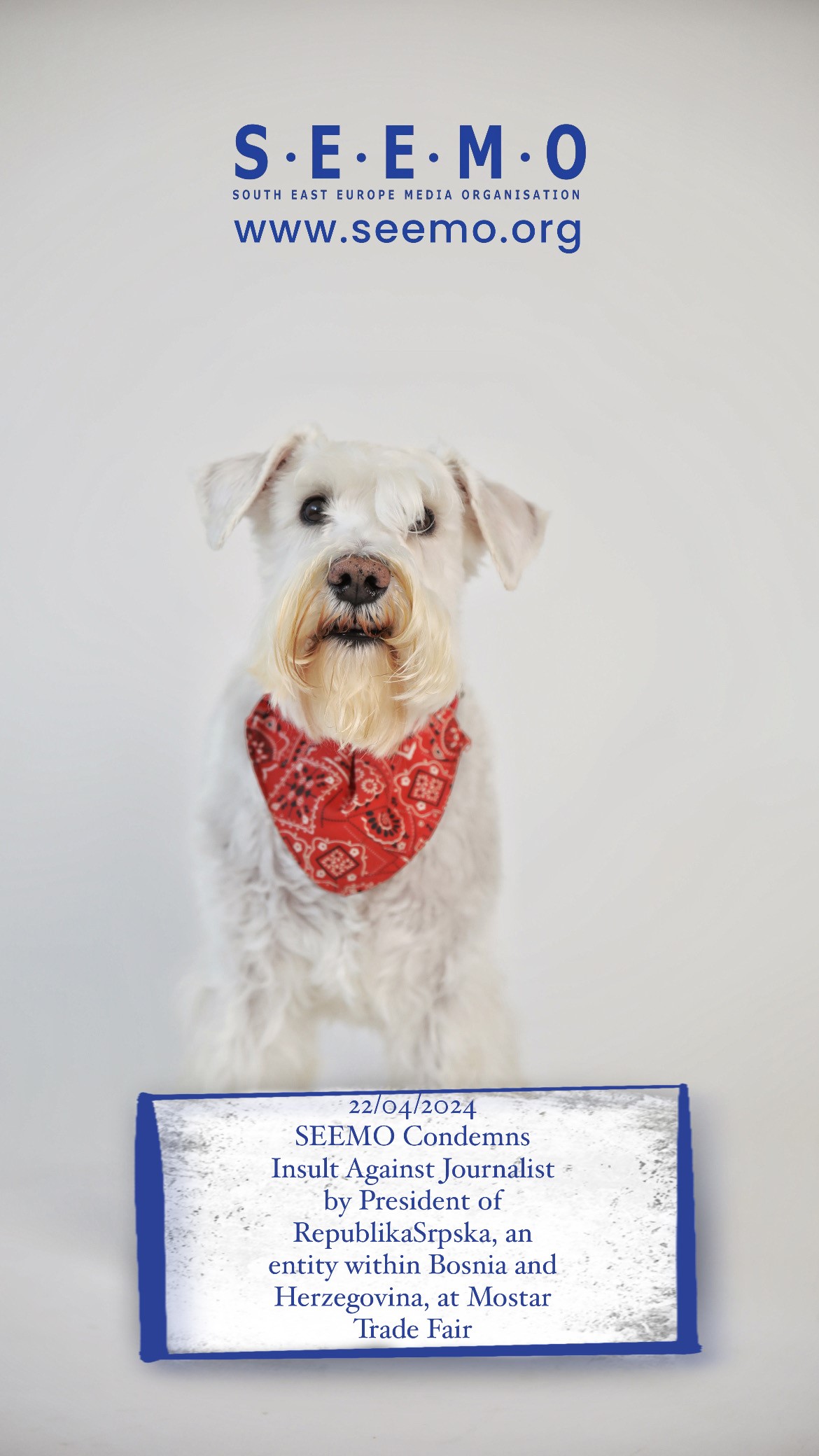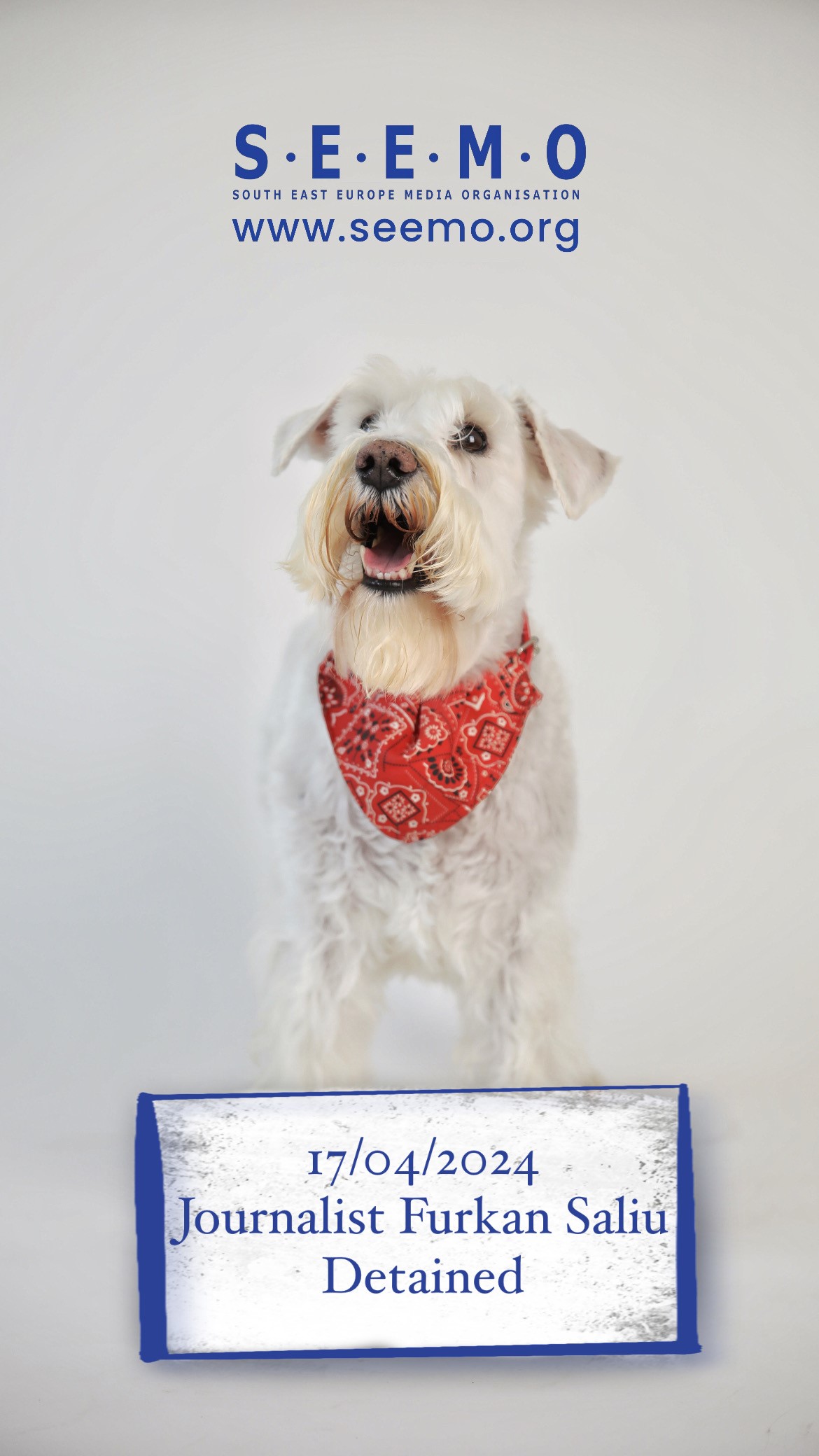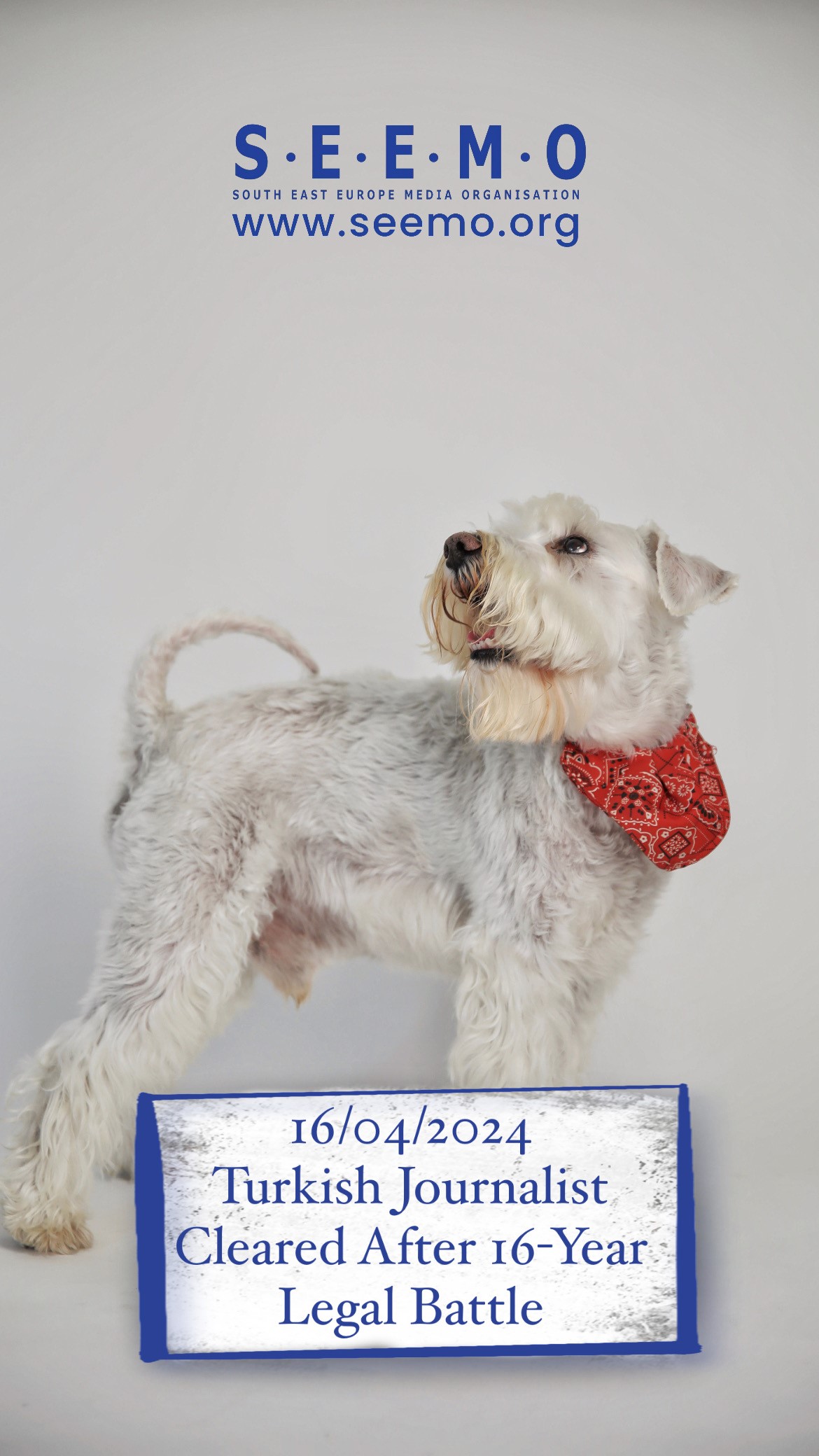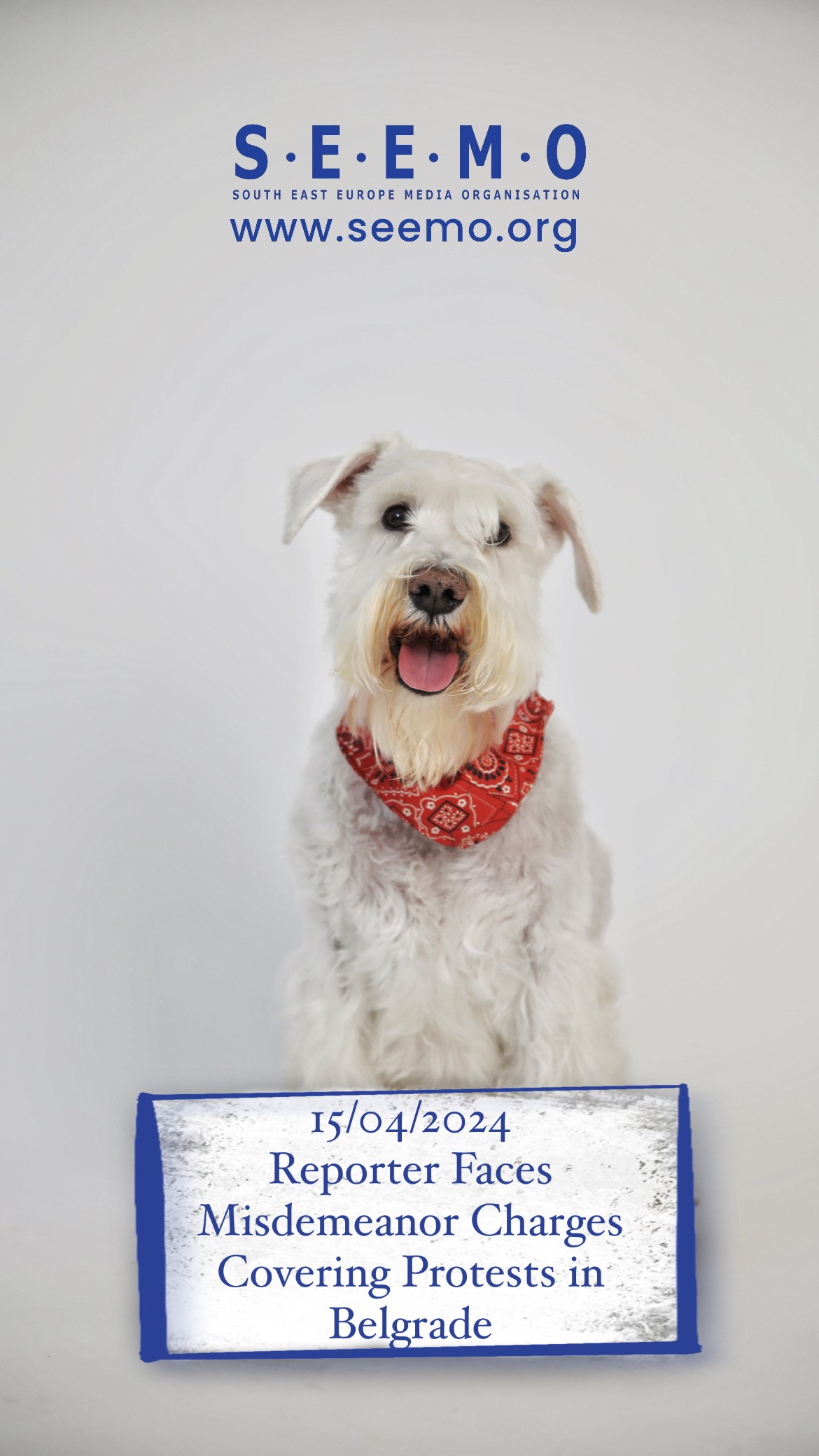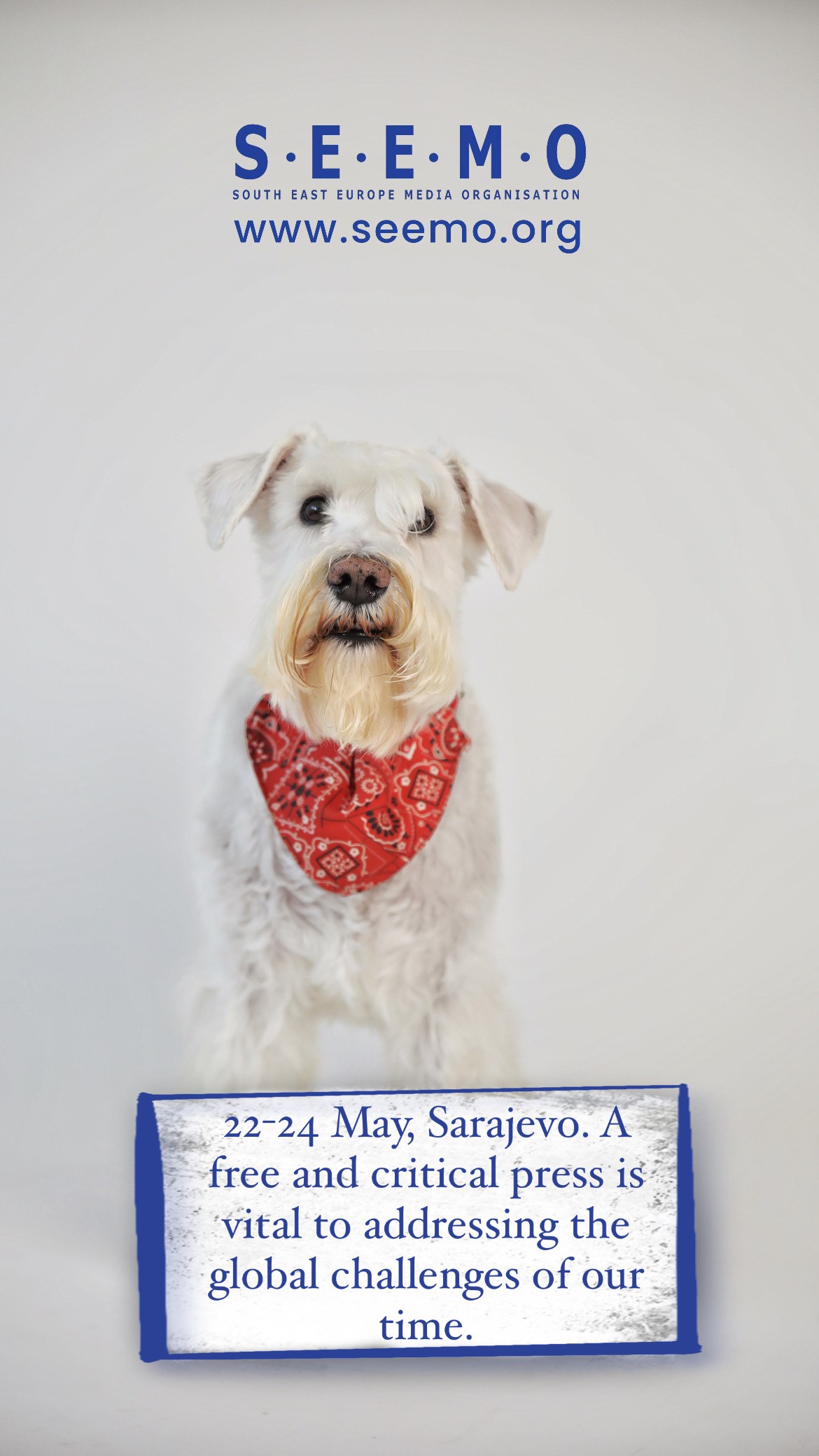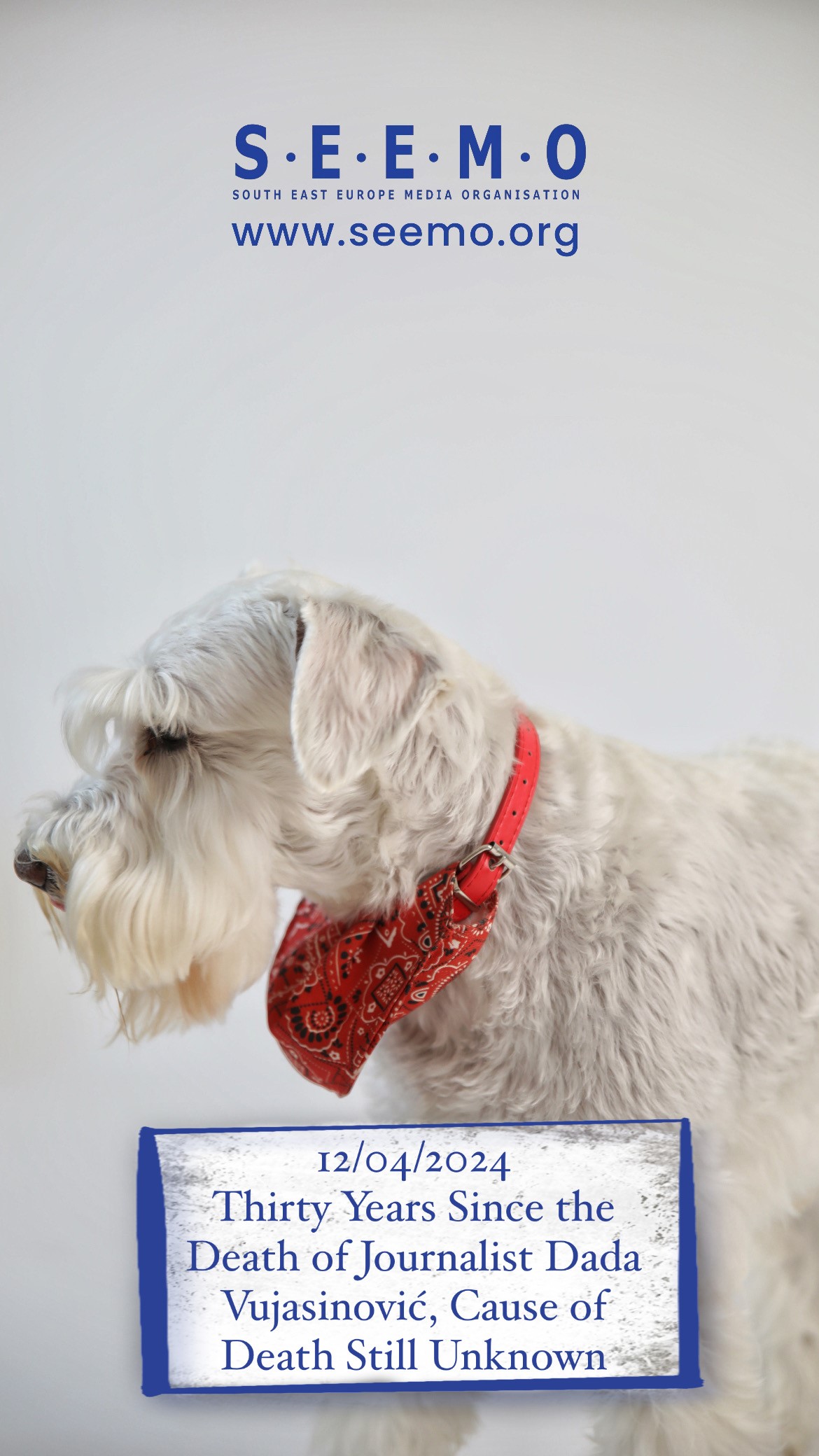23 April 2024: Petition for Domani
22.04.2024 – SEEMO Condemns Insult Against Journalist by President of Republika Srpska, an entity within Bosnia and Herzegovina, at Mostar Trade Fair
The South East Europe Media Organisation (SEEMO) condemns the recent incident involving an insult directed at a journalist from N1 BiH by Milorad Dodik, the President of Republika Srpska, an entity within Bosnia and Herzegovina, during his visit to the Trade Fair in Mostar, Bosnia and Herzegovina on 16 April 2024.
During the meeting that took place in front of the cameras in the presence of Milorad Dodik and the President of Serbia, Aleksandar Vučić, Dodik is heard to disparage the journalist of N1 BiH.
More details are online in a video: https://www.youtube.com/watch?time_continue=715&v=YGq1ZGYvfW0&embeds_referring_euri=https%3A%2F%2Fwww.index.hr%2F&source_ve_path=MjM4NTE&feature=emb_title
SEEMO underscores that insults against journalists is utterly unacceptable, particularly when coming from public figures. The unfortunate incident highlights the pressing need for upholding the principles of free speech, respect for media freedom, and dignified discourse in the public domain.
SEEMO calls upon Dodik to issue a public apology to the journalist in question and urges all stakeholders in the public sphere in Republika Srpka, Bosnia and Herzegovina, to uphold the values of journalistic integrity and freedom of expression.
South East Europe Media Organisation (SEEMO) is a regional non-governmental, non profit network of editors, media executives and leading journalists in Southeast, South, East and Central Europe. SEEMO members are in Albania, Armenia, Azerbaijan, Belarus, Bosnia-Herzegovina, Bulgaria, Croatia, Cyprus, Czech Republic, Estonia, Georgia, Greece, Hungary, Kazakhstan, Kosovo, Kyrgyzstan, Latvia, Lithuania, Malta, Moldova (with the territory of Transdnestria), Montenegro, North Macedonia, Poland, Romania, Russia, Serbia, Slovakia, Slovenia, Tajikistan, Turkmenistan, Türkiye / Turkey, Ukraine and Uzbekistan. Austria, Italy, Vatican and San Marino have a special status in SEEMO. SEEMO has over 3000 individual members, and additional media as corporate members.
#fyp #mediafreedom #seemo #freespeech #southeasteuropemediaorganisation #ngo #journalist #republikasrpska #bosnaandherzegovina #serbia #N1 #SEEMO #pressfreedom #mediafreedom #freemedia
19.04.2024 – Georgia’s Press Freedom Under Threat: Controversy Surrounds ‘Foreign Agent’ Law and Parilamentary Access Restrictions
The Georgian Parliament’s decided on 14 April 2024 to bar journalists from digital media outlets from accessing the Parliament building. This move, enacted under the guise of “Enhancing Safety Measures,” effectively prevented a group of journalists from reporting on critical debates, including the discussion of the reintroduced bill on “Transparency of Foreign Influence” by the Legal Issues Committee. Journalists from broadcast media were exempt.
This restrictive measure follows a previous incident on 8 April 2024, where access to Parliament was limited for reporters from independent and critical media organizations during discussions on the official registration of the aforementioned draft law. The Georgian Charter of Journalistic Ethics (https://www.qartia.ge/en/about-us), along with other media freedom advocates, condemned this decision, denouncing it as discriminatory and urging the Parliament to uphold press freedom principles.
In parallel, concerns have been raised regarding the reintroduction of a controversial “foreign agent” law by the government and Georgia’s ruling party, Georgian Dream (GD). This legislation, would require organizations receiving foreign funds, including media outlets and Non-governmental organization (NGO), to register as “organizations pursuing the interests of a foreign power.” Despite assurances last year that such legislation would not be reconsidered, GD announced its intent to reintroduce the bill, now titled “Transparency of Foreign Influence.” It would require organisations receiving more than 20% of their funding from abroad to register as “foreign agents” or face large fines. This proposed law poses a grave threat to media freedom and civic space in Georgia, potentially undermining the country’s democratic progress and EU membership aspirations. President of Georgia Salome Zourabichvili has voiced strong opposition to the bill, accusing the government of jeopardizing Georgia’s EU accession efforts. The government passed the draft bill on its first reading.
In response to these developments, journalists and citizens have organized protests outside the Parliament in capital Tbilisi, demanding the withdrawal of the controversial bill and the protection of media freedom. How it looked is visible on the following link:
https://x.com/Zourabichvili_S/status/1779939731993669974 . The Public Defender of Georgia has also weighed in, stressing the importance of ensuring media access to parliamentary proceedings and denouncing any attempts at censorship or discrimination.
The South East Europe Media Organisation (SEEMO) condemns the recent actions taken by the Parliament of Georgia, including the implementation of heightened security measures and the restriction of access for journalists. This move, coupled with the reintroduction of the “Foreign Agent” law, poses a serious threat to press freedom and democratic principles in Georgia. SEEMO urges the Georgian authorities to uphold the rights of all journalists to report freely and without discrimination, ensuring a transparent and open environment for media coverage of parliamentary activities. Such restrictions undermine the vital role of the press in holding power to account and fostering informed public discourse, and they must be reversed immediately.
South East Europe Media Organisation (SEEMO) is a regional non-governmental, non profit network of editors, media executives and leading journalists in Southeast, South, East and Central Europe. SEEMO members are in Albania, Armenia, Azerbaijan, Belarus, Bosnia-Herzegovina, Bulgaria, Croatia, Cyprus, Czech Republic, Estonia, Georgia, Greece, Hungary, Kazakhstan, Kosovo, Kyrgyzstan, Latvia, Lithuania, Malta, Moldova (with the territory of Transdnestria), Montenegro, North Macedonia, Poland, Romania, Russia, Serbia, Slovakia, Slovenia, Tajikistan, Turkmenistan, Türkiye / Turkey, Ukraine and Uzbekistan. Austria, Italy, Vatican and San Marino have a special status in SEEMO. SEEMO has over 3000 individual members, and additional media as corporate members.
#fyp #mediafreedom #seemo #freespeech #southeasteuropemediaorganisation #ngo #journalist #georgia #SEEMO #pressfreedom #mediafreedom #freemedia
18.04.2024 – Bulgarian Journalists Under Siege
The South East Europe Media Organisation (SEEMO) is closely monitoring the ongoing full-scale assault against the website BIRD (https://bird.bg/en/’) and its journalists. The campaign is among others against BIRD journalist Dimitar Stoyanov (Димитър Стоянов). The Association of European Journalists – Bulgaria (AEJ) – Асоциация на европейските журналисти – България (АЕЖ) – https://aej-bulgaria.org/en/ is outraged by the latest vexatious lawsuit (SLAPP) filed against the team of the investigative website BIRD.bg by one of the leading politicians in the county.
The Association of European Journalists-Bulgaria revealed that several lawsuits have been filed in the District Court in Sofia, Bulgaria, against journalists Dimitar Stoyanov, Atanas Chobanov (Атанас Чобанов), and their colleague from Bivol (https://bivol.bg/en), Nikolay Marchenko (Николай Марченко). The plaintiff in all cases is the same. Each lawsuit amounts to 10,000 LEV ( 5,118.66 EUR).
BIRD announced that they have been SLAPPed on the very same day when Stoyanov was called to the prosecution for questioning as a witness in pre-trial proceedings for the release of classified information.
They target publications related to the infrastructure around the border crossing to Turkey “Captain Andreevo,” widely circulated suspicions in the public space about serious corruption practices, as well as allegedly those related to the suspicions surrounding the murder of crypto queen Ruja / Rusha Ignatova (Ружа Игнатова). You can read the AEJ article here: https://aej-bulgaria.org/10042023/
The almost simultaneous filing of a series of identical lawsuits against journalists for publications over a short period of time in the same outlet is a serious indicator of Strategic Lawsuits Against Public Participation (SLAPP).
In a press release from 7 April, 2023, the prosecution disseminated a series of insinuations, as well as personal communication of journalist Dimitar Stoyanov, with his source of information.
It is important to recall that in order to carry out their work, which is inherently in the public interest, journalists work and communicate with a wide range of sources.
AEJ insists that the prosecution immediately cease its attempts to discredit journalists simply because it dislikes their publications, as well as to cease the practice of revealing journalistic sources.
The South East Europe Media Organisation (SEEMO) will closely monitor the developments surrounding this case.
South East Europe Media Organisation (SEEMO) is a regional non-governmental, non profit network of editors, media executives and leading journalists in Southeast, South, East and Central Europe. SEEMO members are in Albania, Armenia, Azerbaijan, Belarus, Bosnia-Herzegovina, Bulgaria, Croatia, Cyprus, Czech Republic, Estonia, Georgia, Greece, Hungary, Kazakhstan, Kosovo, Kyrgyzstan, Latvia, Lithuania, Malta, Moldova (with the territory of Transdnestria), Montenegro, North Macedonia, Poland, Romania, Russia, Serbia, Slovakia, Slovenia, Tajikistan, Turkmenistan, Türkiye / Turkey, Ukraine and Uzbekistan. Austria, Italy, Vatican and San Marino have a special status in SEEMO. SEEMO has over 3000 individual members, and additional media as corporate members.
#fyp #mediafreedom #seemo #freespeech #southeasteuropemediaorganisation #ngo #journalist #bulgaria #BIRD #DimitarStoyanov #SEEMO #pressfreedom #mediafreedom #freemedia
Save the date: XVIII SOUTH EAST EUROPE MEDIA FORUM (SEEMF), 27-28 November 2024 in Podgorica, Montenegro
#SEEMF2024: XVIII South East Europe Media Forum (SEEMF)– 27 and 28 November 2024 in Hotel Voco in Podgorica, Montenegro. Be part of the leading media event in this part of Europe with participants from more than 30 countries.
Registration: info@seemf.org and info@seemo.org .
SEEMF by South East Europe Media Organisation (SEEMO), Konrad Adenauer Stiftung Media Program SEE and the Central European Initiative (CEI) and with support of European Broadcasting Union (EBU), German News Service by Deutschen Welle (DW) and Deutsche Presse-Agentur (dpa), SECEPRO, II-IMC and IA.
Local partners: Vijesti and University of Montenegro.
17.04.2024 – Journalist Furkan Saliu Detained
On 7 April 7 2024 around 5pm, journalist Furkan Saliu, who is also the founder and editor-in-chief of PortaliX (https://portalix.mk/), was detained for several hours by special police forces in the village of Konjare / Konyare (Коњаре), North Macedonia following a football match. He was taken to the Gazi Baba / Avtokomanda police station in the capital Skopje.
Details surrounding the incident are still emerging, and PortaliX has condemned Saliu’s arrest as a targeted effort to intimidate free journalism. The video from the moment when the police reacted is online: https://www.youtube.com/shorts/-A3rVq9M5IQ?feature=share
Saliu himself, in a statement expressed regret for potentially contributing to the escalation of the situation leading to his detention. He denied any assault on the police and clarified that the weapon found in his vehicle was licensed. Despite this, the police confiscated his phone and keys during the arrest.
The Ministry of Internal Affairs reported that the police intervened to quell a confrontation between home team fans and visiting players, during which two individuals, including Saliu, allegedly attacked police officers. Subsequently, Saliu was taken into custody, but later released the same night.
Furthermore, conflicting reports emerged regarding the circumstances of Saliu’s arrest, with alleging excessive use of force by the police. Witnesses at the football match claimed that Saliu alleged intervened after the police started beating an young person with no reasons, which Saliu recorded with his mobile phone.
The incident has sparked widespread condemnation from opposition parties and journalists’ associations, who demand an impartial investigation into the events leading to his arrest.
Interior Minister defended the police’s actions, stating that Saliu was detained for allegedly assaulting police officers and urged the public to allow law enforcement to conduct their duties without interference.
As the situation unfolds, stakeholders emphasize the importance of upholding press freedom and ensuring the protection of journalists’ rights in Macedonia.
The South East Europe Media Organisation (SEEMO) will follow the case closely. SEEMO urges the authorities to ensure transparency and accountability in handling this case, to respect the fundamental right to freedom of expression, and to refrain from any actions that may intimidate or hinder the work of journalists.
South East Europe Media Organisation (SEEMO) is a regional non-governmental, non profit network of editors, media executives and leading journalists in Southeast, South, East and Central Europe. SEEMO members are in Albania, Armenia, Azerbaijan, Belarus, Bosnia-Herzegovina, Bulgaria, Croatia, Cyprus, Czech Republic, Estonia, Georgia, Greece, Hungary, Kazakhstan, Kosovo, Kyrgyzstan, Latvia, Lithuania, Malta, Moldova (with the territory of Transdnestria), Montenegro, North Macedonia, Poland, Romania, Russia, Serbia, Slovakia, Slovenia, Tajikistan, Turkmenistan, Türkiye / Turkey, Ukraine and Uzbekistan. Austria, Italy, Vatican and San Marino have a special status in SEEMO. SEEMO has over 3000 individual members, and additional media as corporate members.
#fyp #mediafreedom #seemo #freespeech #southeasteuropemediaorganisation #ngo #journalist #northmacedonia #portalix #furkansaliu #journalistdetained #journalistarrested #SEEMO #pressfreedom #mediafreedom #freemedia @FurkanSaliu
16.04.2024 – Turkish Journalist Cleared After 16-Year Legal Battle
After a protracted legal battle spanning 16 years, Turkish journalist Hacı Boğatekin has been acquitted by the 1st High Criminal Court in his home town Adıyaman, Türkiye / Turkey following an order by the Turkish Supreme Court of Appeals.
Boğatekin’s ordeal began with the publication of his article titled “FETÖ and Apo” in the Gerger Fırat (https://www.gergerfirat.com.tr/) newspaper on 4 January 2008, which led to legal challenges and his subsequent detention and arrest.
Hacı Boğatekin and his son Özgür Boğatekin are publishing the local newspaper Gerger Fırat. Hacı Boğatekin founded Gerger Fırat in 1992. Over the course of his career, Hacı Boğatekin was tried in more than 150 cases. For example, Hacı Boğatekin, has also been sentenced to 1 year and 6 months in prison for an article he penned in 2018 regarding bribery allegations within the judiciary.
The Supreme Court’s decision marked a turning point in Boğatekin’s case, ultimately resulting in his acquittal during the first hearing at the Adıyaman 1st High Criminal Court. The court cited insufficient evidence to support the charges of “making propaganda for a terrorist organisation” against Boğatekin.
In response to the court’s decision, Boğatekin expressed relief, stating that his case has lasted over 16 years, causing material and moral damage. He was according to the first court decision sentenced to more than 12 months in prison. When the decision was approved by the Supreme Court, journalist Boğatekin was imprisoned
Hacı Boğatekin’s lawyer, highlighted the significance of the case for press freedom and freedom of expression. He emphasized that despite the lengthy legal battle, justice was eventually served through the Constitutional Court and the Supreme Court’s decisions.
The legal journey faced by Boğatekin included multiple court rulings and appeals, with the Constitutional Court previously deeming the prison sentence unconstitutional, emphasising the importance of freedom of expression and press in a democracy.
Boğatekin said that the 30 thousand TRY compensation ordered by the court should be taken from the then district governor or the judge who made the decision, otherwise if the money would be paid from the tax-payers, he would distribute it to students as scholarships.
Boğatekin’s case serves as a milestone in the ongoing discourse on press freedom in Türkiye / Turkey, emphasising the vital role of journalists in addressing societal issues and contributing to public debate. The 16-year struggle for justice highlights not only the personal toll endured by Boğatekin but also the broader erosion of democratic values within Türkiye / Turkey judicial system.
The South East Europe Media Organisation (SEEMO) calls for reforms to uphold the rights of journalists in Türkiye / Turkey and also for reforms in the court system. Boğatekin’s case is an example of the problems in the judiciary and justice system.
South East Europe Media Organisation (SEEMO) is a regional non-governmental, non profit network of editors, media executives and leading journalists in Southeast, South, East and Central Europe. SEEMO members are in Albania, Armenia, Azerbaijan, Belarus, Bosnia-Herzegovina, Bulgaria, Croatia, Cyprus, Czech Republic, Estonia, Georgia, Greece, Hungary, Kazakhstan, Kosovo, Kyrgyzstan, Latvia, Lithuania, Malta, Moldova (with the territory of Transdnestria), Montenegro, North Macedonia, Poland, Romania, Russia, Serbia, Slovakia, Slovenia, Tajikistan, Turkmenistan, Türkiye / Turkey, Ukraine and Uzbekistan. Austria, Italy, Vatican and San Marino have a special status in SEEMO. SEEMO has over 3000 individual members, and additional media as corporate members.
#fyp #mediafreedom #seemo #freespeech #southeasteuropemediaorganisation #ngo #journalist #turkey #HacıBoğatekin #GergerFırat #SEEMO #pressfreedom #mediafreedom #freemedia
15.04.2024 – Reporter Faces Misdemeanor Charges Covering Protests in Belgrade
Police Station Novi Beograd in Belgrade, Serbia has filed a request to initiate misdemeanor proceedings against reporter Marko Dragoslavić (@DragoslavicM ) from FoNet(https://www.fonet.rs/), accusing him of “bold and reckless behavior” during citizens’ protests in Block 63 in Novi Beograd, allegedly violating the Law on Public Order and Peace, despite being on assignment, reporting, and sending video footage to the agency from a protest. The police allege that on 17 February 2024, around 6:30 PM, Dragoslavić with a group of masked young individuals, “kicked and broke a metal construction fence.”
Dragoslavić received a summons to appear for questioning at the Misdemeanor Court in Grocka, Serbia on 14 May 2024.
Dragoslavić recalls that the fence demolition occurred on 15 February 2024, when he sent video footage to FoNet, which the agency published.
The next day, on 16 February 2024, allegedly an undercover policeman identified him during the filming of a peaceful citizens’ protest in Belgrade, although the policeman did not identify himself, but instead took his ID card, photographed it, and, contrary to the provisions of the Police Law, allegedly threw his press accreditation on the ground. Reporter Dragoslavić also possesses video footage of the police identification on 16 February 2024.
Dragoslavić asserts that on 17 February 2024, he again recorded protests, which were peaceful, and denies participating in the “kicking and breaking of the fence,” which was already demolished.
The FoNet news agency and Dragoslavić himself will take all legal measures to protect him in the event of misdemeanor proceedings initiated while he was on assignment.
The South East Europe Media Organisation (SEEMO) is asking the Serbian Ministry of Internal Affairs to urgently investigate this case, check all facts and protect the Fonet journalist from a very strange legal case.
South East Europe Media Organisation (SEEMO) is a regional non-governmental, non profit network of editors, media executives and leading journalists in Southeast, South, East and Central Europe. SEEMO members are in Albania, Armenia, Azerbaijan, Belarus, Bosnia-Herzegovina, Bulgaria, Croatia, Cyprus, Czech Republic, Estonia, Georgia, Greece, Hungary, Kazakhstan, Kosovo, Kyrgyzstan, Latvia, Lithuania, Malta, Moldova (with the territory of Transdnestria), Montenegro, North Macedonia, Poland, Romania, Russia, Serbia, Slovakia, Slovenia, Tajikistan, Turkmenistan, Türkiye / Turkey, Ukraine and Uzbekistan. Austria, Italy, Vatican and San Marino have a special status in SEEMO. SEEMO has over 3000 individual members, and additional media as corporate members.
#fyp #mediafreedom #seemo #freespeech #southeasteuropemediaorganisation #ngo #journalist #serbia #markodragoslavic #fonet #SEEMO #pressfreedom #mediafreedom #freemedia @DragoslavicM
22-24 May, Sarajevo. A free and critical press is vital to addressing the global challenges of our time
22-24 May, Sarajevo. A free and critical press is vital to addressing the global challenges of our time. Join for #IPIWoCo “Navigating Crises: Journalism at a Turning Point” where leading journalists, editors, and publishers will share their ideas 👉 https://buff.ly/3Qfu4rT
To all journalists, media professionals, and advocates for press freedom! The International Press Institute is hosting the annual #IPIWoCo, taking place May 22-24 in Sarajevo, Bosnia and Herzegovina. 🌍📰
The event will bring together experts from around the world to discuss the pressing issues facing the media industry today, from digital innovation to press freedom and media ethics.
Join us for engaging discussions, networking opportunities, and the chance to learn from some of the most respected names in journalism.
Don’t miss this opportunity to be a part of a global conversation on the future of the media.
Visit ipi.media to learn more and register. #IPIWoCo #MediaInnovation
12.04.2024 – Thirty Years Since the Death of Journalist Dada Vujasinović, Cause of Death Still Unknown
Thirty years have passed since the tragic death of Radislava Dada Vujasinović, a prominent journalist working for Duga (Rainbow) weekly in Serbia, known for her fearless reporting during the turbulent war times in former Yugoslavia. Yet, the circumstances surrounding her death remain shrouded in mystery, with no definitive resolution in sight.
Dada Vujasinović was discovered lifeless on 9 April 1994, in her apartment on Third Boulevard, number 118, in Novi Beograd in Belgrade, Serbia. Despite decades of investigation, the cause of her death remains undetermined, fueling speculation ranging from suicide to homicide. She was last seen alive in her apartment on 7 April 1994, where she was sitting with a friend until a little after midnight. As she was not reacting on phone calls and coming to her newsroom, two friends opened her apartment where they found her dead. Initially, Serbian authorities concluded that Vujasinović had taken her own life. The police investigation was carried out without the presence of the judge on duty, who was subsequently informed that it was a suicide, what was against rules. Finger prints from the hunting rifle used to commit the alleged suicide were never taken. None of the neighbors heard the shot from the gun.
In 2008, 14 years after her dead, a recognized ballistics expert in Serbia conducted a series of examinations and concluded that she was killed. He submitted his report to the court, in which it is stated that two parts of a bullet were found in the body of the deceased, which means that Dada was shot twice.
The handling of the investigation has raised serious concerns. Questions persist about the disappearance of crucial evidence, including a notorious green file from her apartment, and allegations of tampering with forensic findings. The lack of transparency and accountability in the investigative process has only compounded the anguish of Dada’s family and friends.
Dada Vujasinović was not just a journalist, she was a courageous truth-seeker who fearlessly confronted the powers that be. Her uncompromising reporting on organized crime, about the Serbian underground and criminals, about the war in former Yugoslavia that started 1991, war profiteers, the army, the police, unsolved murders, earned her both accolades and enemies. Despite facing threats and intimidation, she remained resolute in her pursuit of truth and justice. She reported often also about the Serbian paramilitary commandant and criminal Željko Ražnatović Arkan. According to several sources, Arkan allegedly once called her and said to her that she will be killed.
Efforts to shed light on Dada’s death have been met with obstacles and setbacks, highlighting systemic failures within the justice system. Despite calls for a thorough and impartial investigation, progress has been slow, and justice remains elusive.
The unresolved circumstances surrounding the death of Radislava Dada Vujasinović, stand as a poignant symbol of the challenges faced by journalists in pursuit of justice and accountability. Despite three decades having passed since her tragic demise, the quest for answers continues to be thwarted by a combination of institutional failures, evidence tampering, and a lack of political will. The conflicting narratives, the mishandling of crucial evidence, and the apparent reluctance of authorities to fully investigate the case cast a shadow over Serbia’s judiciary and its commitment to upholding press freedom and the rule of law. As we reflect on Dada’s unwavering dedication to uncovering the truth, it serves as a sobering reminder of the importance of safeguarding journalistic integrity and the imperative of ensuring that those who seek to silence voices of dissent are held accountable.
South East Europe Media Organisation (SEEMO) reminds that revealing the background of her death is the basis for the democratic development of Serbia.
South East Europe Media Organisation (SEEMO) is a regional non-governmental, non profit network of editors, media executives and leading journalists in Southeast, South, East and Central Europe. SEEMO members are in Albania, Armenia, Azerbaijan, Belarus, Bosnia-Herzegovina, Bulgaria, Croatia, Cyprus, Czech Republic, Estonia, Georgia, Greece, Hungary, Kazakhstan, Kosovo, Kyrgyzstan, Latvia, Lithuania, Malta, Moldova (with the territory of Transdnestria), Montenegro, North Macedonia, Poland, Romania, Russia, Serbia, Slovakia, Slovenia, Tajikistan, Turkmenistan, Türkiye / Turkey, Ukraine and Uzbekistan. Austria, Italy, Vatican and San Marino have a special status in SEEMO. SEEMO has over 3000 individual members, and additional media as corporate members.
#fyp #mediafreedom #seemo #freespeech #southeasteuropemediaorganisation #ngo #journalist #serbia #dadavujasinovic #journalistdeath #unsolvedjournalistdeath #SEEMO #pressfreedom #mediafreedom #freemedia

